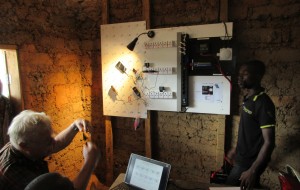Community Energy: Solar Mobile Phone Charger and Hospital Power
The pilot solar energy project in the Kenema District in Sierra Leone consists of two parts:
- The establishment of 5 local mobile phone charging stations powered by solar panels in the communities Malehun, Tiboju, Samie Sendema, Ngeyaweima and Nyandeyame, who combined have approx. 2100 inhabitants.
- Provision of solar power to a rural health clinic in the community of Vaahun.
The communities taking part in this project are associated with phase II of CISU funded WASH project.
In Sierra Leone the building of and access to the electrical grid is focused around the capital Freetown, while the rural areas are not a priority. The overall access to electricity is below 6 % of the population, while 83 % report to have access to a mobile phone. With the establishment of solar powered mobile charging stations in rural villages, the locals can charge their phone in the village and will not have to travel to the nearest town. In the longer term the solar-powered charging station will potentially lead to economic development of the community through improved business opportunities.
Provision of solar energy to a rural health clinic allow it to obtain lighting, fridge and power for basic medical equipment leading to improved health care for the rural population as well as improved possibilities for health education. It also reduces the need for kerosene, candles and fossil fuels, which are a financial and health burden to the clinic.
Both solar energy projects will improve the living conditions of the population living in rural areas in Sierra Leone who is currently without access to the electricity grid, through the provision of affordable, reliable and clean electricity.
All 5 participating communities have been involved in prior EWB DK / EWB SL project activities on water and sanitation. The selection of the communities is based on a demonstrated ability to organise around community projects and ability to manage community funds.
Timeline:
- Fall 2014: The solar energy equipment was purchased and sent to Sierra Leone
- July 2015: Memorandums of Understanding (MOU’s) were signed with the 5 villages and the health clinic. After this, individual operation systems were established and the user-payment schemes were described in order to save money for future maintenance.
- July 2016: The technical installation mission lasting 18 days was completed. This mission also included training in operation and maintenance and a follow-up for immediate quality assurance and a fact-finding to enable further expansion of solar energy activities in Sierra Leone. The local partner EWB SL has continued with training and support to the communities until end 2016.
The project contributes to the UN Sustainable Development Goals regarding affordable and clean energy (#7) and partnerships for the goals (#17).
Specifications
- Project No.: 067
- Categories: Environment, West Africa, Sustainable Energy, Sierra Leone
- Budget: DKK 277.766
- Project Manager: Hanne Holm Brehm
- Partner Organization: EWB-SL

